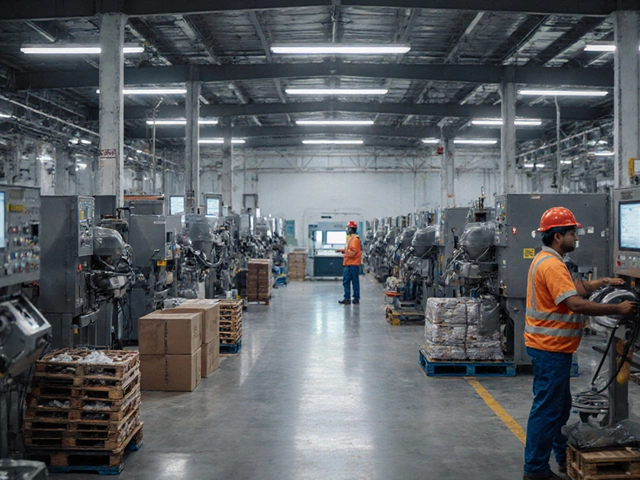What’s the Most Common Manufacturing System? Explained
Oct 9 2025
When you bite into a bag of roasted nuts, a slice of packaged cheese, or a ready-to-eat meal, you're consuming the result of a food processing unit, a facility or system that transforms raw agricultural products into safe, shelf-stable food for consumers. Also known as food manufacturing units, these are the hidden engines behind every bite of processed food you buy—whether it’s cereal, snacks, or frozen meals. Without them, most of the food on grocery shelves wouldn’t exist. They clean, sort, cook, mix, package, and preserve ingredients using machines and controlled environments that keep food safe and consistent.
These units don’t just chop and cook. They rely on precise unit operations, the fundamental steps like cleaning, separation, heat exchange, size reduction, mixing, and packaging that form the backbone of every food production line. For example, a single 5 μm filter, a tiny but critical component in liquid filtration systems can catch harmful particles before they reach your food. Or take the mil, a unit of measurement equal to 0.001 of an inch—used to ensure slicing blades cut fruits or meats to exact thicknesses. Even small details like these make a big difference in quality and safety.
Behind the scenes, companies use systems like CPU, or Central Production Unit—a centralized kitchen that prepares food for multiple restaurant locations—to cut costs and keep flavors uniform. Meanwhile, SAP, or Superabsorbent Polymers, help keep packaged foods dry and fresh by locking in moisture without chemicals. And if you’ve ever seen "PC" on a menu, that’s portion control, a method used to standardize serving sizes and pricing—often tied directly to how food is processed in bulk.
But it’s not all efficiency and innovation. Some of the most processed foods on the planet—like instant noodles and sugary snack bars—are also among the unhealthiest. The same units that make food convenient can also strip nutrients and load in preservatives. That’s why knowing how your food is made matters. Whether you’re a small business owner looking to start a snack line, a home cook curious about kitchen gadgets, or just someone trying to eat better, understanding food processing helps you make smarter choices.
Below, you’ll find real breakdowns of how these systems work, what makes certain foods more profitable, why measurements like microns and mils matter, and what hidden terms on menus actually mean. No fluff. Just clear facts from people who work with these machines every day.
Food processing units are the factories that turn raw ingredients into the food you eat. Learn the five main types, how they work, and why scale, safety, and technology matter in every bite.
Discover the most profitable food products to sell in 2025, from roasted nuts and dried fruits to plant-based protein bars. Learn why snacks beat fresh food in margins and how small processors are making big profits with minimal equipment.
Discover the most profitable foods to sell in 2025 for small food processors. Learn which items offer the highest margins, how to start with minimal investment, and where to sell for maximum returns.
Discover which food tops the list as the most processed worldwide, why instant noodles win, and how production, health, and sustainability intertwine.
Wondering about the main downside of a food processor? This article breaks down the most significant disadvantage, along with real-world tips, facts, and details no one tells you.
Ever wondered how raw grains turn into breakfast cereals or how milk becomes cheese? A food processing unit is the heart of that transformation, handling cleaning, sorting, cooking, and packaging. These machines make food safer and last longer while boosting efficiency for producers. Understanding how they work can help anyone interested in making food at home or starting a small food business. This article breaks down what food processing units do and why they're so important for both big factories and home kitchens.
5 μm pops up all the time in food processing, but what does it really mean? This article breaks down microns, especially 5 μm, and shows how tiny things can make a big difference. You'll see where 5 μm fits in with filters and safety, and pick up some simple tips for making sense of food safety specs. Find out how understanding this measurement can help you choose the right gear or check if your processes are tight enough. Get ready to see food processing through a sharper lens.
Ever seen 'PC' next to a dish price and wondered what it means? This article sheds light on what 'PC' stands for on menus, how it relates to food processing units, and why it matters. Get practical tips for spotting and understanding these menu codes. Learn how restaurateurs use 'PC' for pricing and portion control. You'll never look at a food menu the same way again.
Ever heard someone mention a 'CPU' in a restaurant and wondered what it means? In the food world, CPU stands for Central Production Unit—a hub for prepping, cooking, and moving food out to other kitchens or outlets. This article digs into how CPUs help streamline restaurant operations, save cash, and boost food consistency. You'll find practical tips on setting up and maximizing your own CPU. Read on to see why even small restaurants are jumping on the CPU bandwagon.
This article dives into the role of SAP, or Superabsorbent Polymers, in the world of food processing. It explores how these polymers help improve the safety and efficiency of food handling and packaging. The piece touches on the environmental impact, safety benefits, and tips for professionals using SAP. Whether you're curious about the tech behind your snacks or work in the industry, let's look at why SAP matters.
Exploring the unhealthiest food linked to processed units, this article covers the impact on health and why these foods are considered hazardous. With a focus on what makes these foods risky, it provides insights into their content, potential health effects, and practical tips for making healthier choices. The aim is to provide readers with a clear understanding of the hidden dangers lurking in popular processed foods.
In the world of food processing, precision is key, and understanding measurements like 0.001 of an inch can make a significant difference. Known as a 'mil,' this minute measurement is crucial for ensuring consistency and quality. From slicing fruits to packaging delicate products, knowing your mils helps maintain standards in production. Learn more about the tools and practices that rely on this tiny yet impactful unit.

Oct 9 2025

Mar 29 2025

Feb 26 2025

Apr 1 2025

Jun 4 2025